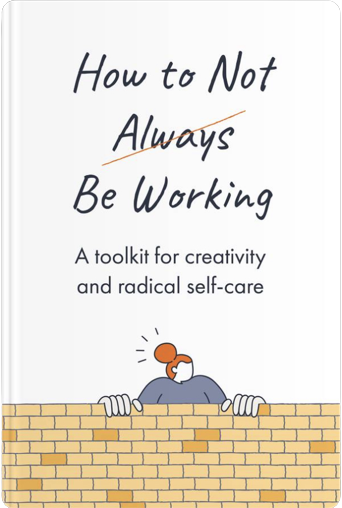Do you find yourself constantly working, even during your free time? It’s time to take a step back and understand what work really means. Let’s take a cue from Marlee Grace, who turned her favorite hobby, knitting, into a business. But soon enough, she became consumed with work, constantly checking emails even when spending time with her spouse! She continued generating income without realizing she was getting obsessed.
After her marriage ended and she relocated to California, she became her own boss. Though she could work at her own pace, she was entirely on her own, which was scary. She lost herself in work, neglecting her health and body. But gradually, she learned to be deliberate about not working and prioritizing her well-being.
Takeaways
Benefits of Free Time and Well-being
- Understand what work really means to you.
- Be aware of how turning a hobby into work can lead to being consumed with work.
- Prioritize your health and well-being to avoid burnout.
- Learn to be deliberate about not working and take breaks when needed.
Understanding What Work Means
- Work is not always what is hard, and what is easy is not always not work.
- Jobs we enjoy doing can eventually feel like work and exhaust us.
- To make boring tasks fun, try playing music or doing something enjoyable.
- Work is subjective, and even hobbies can become work when they become the only things you do.
- Identify what work is to you by making a list of all the things you consider as work.
- Delegate tasks to ease your workload and provide jobs for others.
- Take it easy and don’t be too hard on yourself.
- Be grateful for your work and write down what you’re thankful for.
Workspace & Time Management
- Your workspace should be how you want it to be and support your style of work.
- Create a tablespace with your favorite things to make your workspace comfortable and encourage productivity.
- Write down a list of non-work activities to have an overview of how you spend your time.
- Identify your work time, personal time, and sleep time to manage your time effectively.
- Establish a work-free period, such as mornings or evenings, that works for you.
- Develop a nighttime ritual that suits your lifestyle and personality to relax and unwind.
Gray Areas & Sticking to What’s Rewarding
- Gray areas are ill-defined situations in which it is difficult to judge what is right or wrong.
- Identify gray areas in your work by studying your daily activities. Write down your findings and notice what keeps repeating itself.
- Utilize social media only if it benefits you, otherwise consider it a gray area.
- Work in a way that allows you to stay committed to yourself, your business, and your family.
- Follow artist duo Peter Fischli and David Weiss’ tips to work better:
- Do one thing at a time.
- Know the problem.
- Learn to listen.
- Learn to ask questions.
- Distinguish sense from nonsense.
- Accept change as inevitable.
- Admit mistakes.
- Say it simple.
- Be calm.
- Smile.
Phone Break
- Overcome phone addiction by deleting apps, using a flip phone, or using a phone box.
- Use apps like “moment,” “freedom,” or “self-control” to monitor screen time and moderate phone use.
- Take a break by doing activities like making a healthy meal, listening to music, or taking a walk.
- Use yoga, stretching, light movement, and peaceful techniques to take a break and increase productivity.
- Set strict phone hours or adopt a “No phone after a certain time” rule to improve phone usage habits.
Appreciate Your Uniqueness
- Comparing yourself to others’ success can lead to anxiety and fear.
- Instead of telling yourself you’ve messed up, pick up where you left off and make necessary steps to get back on track.
- Write out dream projects in order of importance and give timelines to complete them to solve the “not having enough time” issue.
- Engage in activities like songs and dance, writing gratitude lists, and reaching out for help to make things less like work.
- Practice the art of saying no if you are a “yes” person and be flexible.
- Remember that you’re not alone in your struggles and find support groups, therapy, or sharing circles.
- Appreciate your uniqueness and remember that your work is whatever you say it is.
Summary
- Pay attention to every person, moment, or gift and love being alive.
- Overworking affects your spirit, mental health, friendships, partnerships, and business.
- Identify what’s not your work and focus on things that matter.
- Look for gray areas in your daily activities and learn to do one thing at a time.
- Switch off your phone and spend time alone for self-development.
- Take a healthy break between work, such as taking a walk or making a meal.
- Embrace your uniqueness and work on your weaknesses.
- Avoid comparing yourself with others and focus on your achievements.
- Create time for relaxation, creativity, and self-care.
Action Items
Boosting Confidence with Self-Love
Title: Boost Your Confidence with Self-Love: Action Items
- Feeling stuck? Practice self-love to boost your confidence.
- Self-love means treating yourself with kindness and compassion.
- Identify your strengths and accomplishments, and celebrate them.
- Practice positive self-talk and challenge negative thoughts.
- Take care of your physical and emotional needs, such as sleep and healthy eating.
- Surround yourself with supportive people who uplift and encourage you.
- Building confidence takes time and effort, but it’s worth it.

